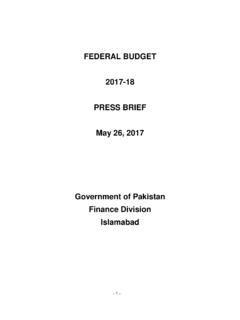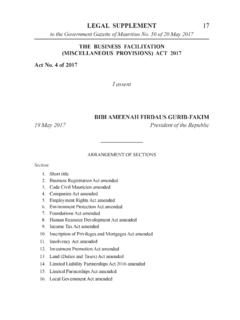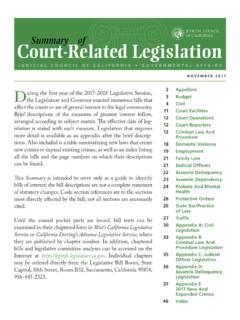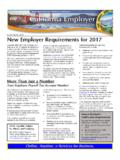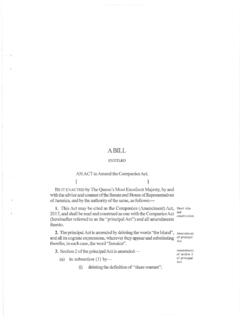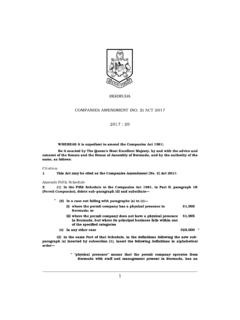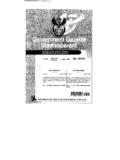Transcription of AN OVERVIEW OF THE COMPANIES (AMENDMENT) BILL, 2017
1 AN OVERVIEW . OF THE. COMPANIES ( amendment ) bill , 2017 . As passed by the Parliament BRIEF SUMMARY. The COMPANIES ( amendment ) bill , 2017 , introduced in Lok Sabha on 16 March, 2016 as The COMPANIES ( amendment ). bill , 2016 was referred to the Standing Committee on Finance on 12 April, 2016. The Committee after hearing the views of the representatives of the Chambers of Commerce and Industry as well as professional bodies adopted its report on 30th November, 2016. The Government after considering the suggestions of the Committee and also the experience gained by it, gave notice of amendments as approved by the Cabinet to the Lok Sabha. The COMPANIES ( amendment ) bill , 2017 passed by Lok Sabha on July 27, 2017 , received the assent of Rajya Sabha on December 19, 2017 . The major amendments proposed include simplification of the private placement process, rationalization of provisions related to loan to directors, omission of provisions relating to forward dealing and insider trading, doing away with the requirement of approval of the Central Government for managerial remuneration above prescribed limits, aligning disclosure requirements in the prospectus with the regulations to be made by SEBI, providing for maintenance of register of significant beneficial owners and filing of returns in this regard to the ROC and removal of requirement for annual ratification of appointment or continuance of auditor.
2 The major official amendments subsequently introduced include continuing with the provisions relating to layers of subsidiaries, continuing with the earlier provisions with respect of memorandum, making offence for contravention of provisions relating to deposits as non-compoundable, requiring attaching of financial statement of associate COMPANIES , stringent additional fees of Rs 100 per day in case of delay in filing of annual return and financial statement etc. This document aims to provide an OVERVIEW of the section wise amendments proposed in the COMPANIES Act, 2013. We hope you will find the same useful. For any suggestions or comments, please send your mail to Regards Team Corporate Professionals CORPORATE PROFESSIONALS 1. THE JOURNEY. CORPORATE PROFESSIONALS 2. AT A GLANCE- COMPANIES ( amendment ) bill 2017 . 1. Start-Ups For company registration, instead of affidavits, declarations will be required;. In case of incorporation, name reserved by the Registrar of COMPANIES ( ROC ).
3 Shall be valid for 20 days from date of the approval instead of 60 days from the date of application, as currently provided. Sweat Equity Shares can be issued at any time. Currently it can be issued after one year from commencement of business;. Partnership or LLP with 2 members (currently 7) can convert into a company 2. Ease of doing In addition to Directors & Key Managerial Personnel, any employee can also business authenticate documents;. Officers not more than one level below the directors who are in whole time employment, can be designated as KMP;. Annual General meeting of unlisted company can be held anywhere in India;. Wholly Owned Subsidiary (WOS) of foreign company can hold EGM outside India;. No Central Government approval for payment of remuneration in excess of 11%. of net profits. 3. Funding Money received under the private placement shall not be utilized unless the return of allotment is filed with the ROC;. Private Placement offer letter shall not contain any right of renunciation.
4 An amount being not less than 20% of the amount of deposits, maturing during the following financial year be deposited on or before the 30th day of April each year and kept in a scheduled bank in a separate bank account to be called deposit repayment reserve account. Currently at least 15% of such amount is required to be deposited and that is also of amount of deposits maturing during a financial year and the financial year next following;. Requirement of providing deposit insurance is proposed to be omitted;. COMPANIES which had defaulted in repayment of deposits, can also accept deposits after a period of 5 years from the date of making good the default 4. Directors Requirement related to resident director eased stay in India for a total period of not less than 182 days during the financial year . Currently it is calculated in reference to previous calendar year;. Central Government can provide any other number to be treated as DIN;. Maximum number of directorship for any person will not include dormant company.
5 Requirement of filing form DIR-11 (filing of a copy of resignation to ROC by director itself) made optional;. Where a director incurs any of disqualifications under section 164 (2) due to default of filing of financial statements or annual return or repayment of deposits or pay interest or redemption of debentures or payment of interest thereon or payment of dividend, then he shall vacate office in all the COMPANIES other than the company which is in default. CORPORATE PROFESSIONALS 3. 5. CSR Eligibility for doing CSR to be determined based on preceding Financial Year . instead of three preceding Financial Years ;. Where a company is not required to appoint an independent director, it shall have in its Corporate Social Responsibility Committee, two or more directors. 6. Auditors Annual rectification of appointment of auditors by members is proposed to be omitted;. Criminal liability in case of fraud proposed to be limited to partner(s) will not include firm 7.
6 Disclosures Abstract version of annual return form for OPC & Small Company will be prescribed;. It is proposed to omit the requirement of MGT-9 extract of annual return, which forms part of the Board's Report. Instead, the copy of annual return shall be uploaded on the website of the company, if any, and its link shall be disclosed in the Board's report;. Disclosures which have been provided in the financial statement shall not be required to be reproduced in the Board report again;. Where key policies related to remuneration etc., are uploaded on the website, if any of a company, then instead of exact text of such policies, key feature of such policies along with its web link shall be disclosed in Board report;. Disclosure by promoters and top ten shareholders with respect to 2% change in shareholding in a listed company is proposed to be omitted. 8. Additional fee, In case of delay in filing document, fact or information required to be submitted penalty and under section 92 (Annual Return) or 137 (Copy of financial statement to be filed compounding with registrar), after expiry of the prescribed period then instead of slab wise additional fees, a flat additional fee as may be prescribed which shall not be less than Rs.
7 100 per day is required to be paid. Different amounts can be prescribed for different class of COMPANIES ;. Where a company fails or commits any default to submit, file, register or record any document, fact or information before the expiry of the period specified in the relevant section, the company and the officers of the company who are in default, shall, without prejudice to the liability for the payment of fee and additional fee, be liable for the penalty or punishment provided under this Act for such failure or default;. Tribunal can now also compound offences those punishable with fine or imprisonment. Currently, such offences can be compounded only by Special Court. CORPORATE PROFESSIONALS 4. SECTION WISE AMENDMENTS. S. No. SECTION amendment . 1 Section 2(6)- Definition of Change in explanation of the term significant influence' under the associate company' definition of Associate Company has been proposed. Significant influence is proposed to mean control of atleast 20% of the voting power or control or participation in business decision under an agreement.
8 Currently the Act provides for control of at least 20% total share capital. Further the term Joint Venture' has also been defined to mean a joint arrangement whereby the parties that have joint control of the arrangement have rights to the net assets of the arrangement. 2 Section 2(28)- Definition of Change in definition of cost accountant' is proposed. cost accountant'. Cost Accountant" means a person who is a member of the Institute of Cost and Works Accountants of India and who holds a valid certificate of practice. 3 Section 2(30)- Definition of Under the definition of the term debenture , it is proposed to exclude Debenture' instruments referred to in Chapter III-D of the Reserve Bank of India Act 1934 and such other instruments prescribed by the Central Government in consultation with the RBI. 4 Section 2(41)- Definition of It is proposed that associate company of a company incorporated outside Financial year' India can also apply to the Tribunal for a different financial year.
9 5 Section 2(46)- Definition of It is proposed that for the purpose of definition of the term holding Holding Company' company', the expression "company" will include any body corporate. 6 Section 2(49)- Definition of It is proposed to delete the definition of the term Interested director'. Interested director'. 7 Section 2(51)- Definition of Under the definition of the term Key Managerial Personnel , such other Key Managerial Personnel' officer not more than one level below the directors who is in whole time employment and designated as KMP by the Board, is proposed to be included. 8 Section 2(57)- Definition of It is proposed to include the debit or credit balance of profit and loss net worth' account in the calculation of net worth. 9 Section 2(71)- Definition of Including the word and' in the definition for more clarity is proposed to public company' clarify that a public company must satisfy both the conditions mentioned in the sub-section. CORPORATE PROFESSIONALS 5.
10 S. No. SECTION amendment . 10 Section 2(72)- Definition of It is proposed that the Central Government may notify other institution public financial institution' which has been established or constituted by or under any Central or State Act other than the COMPANIES Act, 2013 or previous Company Law after consultation with the RBI as public financial institution . 11 Section 2(76)- Definition of Following two amendments are proposed: Related Party'. Instead of only a company, anybody corporate which is holding, subsidiary or an associate company of such company or a subsidiary of a holding company to which it is also a subsidiary or an investing company or venture of the Company, shall be considered as a related party. An investing company or the venturer of the company will mean a body corporate whose investment in the company would result in the company becoming an associate company of the body corporate. 12 Section 2(85)- Definition of It is proposed to increase the maximum paid-up share capital amount small company' which can be prescribed for the purpose of determining a company as a small company from five crore rupees to ten crore rupees and prescribed turnover amount from twenty crore rupees to one hundred crore rupees.
